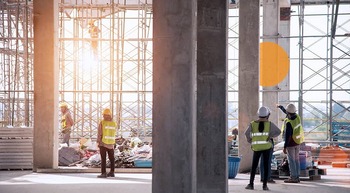What risks do businesses face when they expand internationally?
updated on Jul 31, 2025
France’s intermediate-sized businesses operate internationally: 86% of them export, compared to just 10% of small and medium-sized businesses. Three-quarters of intermediate-sized businesses have a foothold in the European market. Half of them generate more than 50% of their revenue abroad.(1)
Despite the high proportion of intermediate-sized businesses operating outside France, only one third of them say they understand the support available to exporters.(1) Many think that by selling abroad, they will escape the constraints they have to deal with in France. In reality, it’s important to plan ahead for the potential risks before launching an international operation.
Property damage and business interruption
A business needs insurance to protect its premises and assets, wherever they are located. In all countries, buildings, contents and inventories run a risk of being damaged or destroyed. It is therefore vital to take out insurance for property damage and resulting business interruption. Without it, an adverse event could jeopardise the company’s very survival.
Regulatory risks
Be aware of local rules! Every country, even within the European Economic Area, has its own specific legislation, especially where tax is concerned. Intermediate-sized businesses therefore need to study local legislation to understand not only their rights, but also their obligations, to avoid finding themselves liable for penalties. As rules can change from one year to the next, it is important for businesses to monitor developments on an ongoing basis, even once they are established on the new market, especially now that protectionism is back on the political agenda.
Some countries are making it increasingly difficult for industrial companies from abroad to set up operations, in particular by levying new taxes. For example, all transactions in dollars pass through the US Treasury, even if none of the companies involved are located in the USA. If one of the parties to the transaction breaks American rules, which change on a daily basis, they can be fined.
Political risks
In some countries, the authorities may also confiscate your property or require a contract to be terminated for no valid reason. Intermediate-sized businesses need to assess this risk before they decide to move into a market. They must also be aware of the international sanctions in place against particular countries or individuals.
If a company enters into a business relationship with a group where one of the board members is subject to international sanctions, the company is breaking international law. It could face financial or administrative penalties, or even criminal prosecution. Intermediate-sized businesses often have limited knowledge of international rules, and yet breaching them can lead to major consequences with far-reaching effects. It is therefore vital to be alert to this risk.
Climate risks
Before deciding to set up operations in a new country, it is important to assess the risk of natural disasters or severe weather conditions, such as storms, floods, droughts, fires or earthquakes. Climate change and the increased number of environmental disasters occurring across the world make it even more important to take this risk into account.
Every year, extreme weather conditions cause massive destruction. In 2024, French insurers paid out €5 billion in weather-related claims(2). Across the world, floods and forest fires cost billions of euros and disrupt the operations of thousands of businesses.
This makes climate risks another factor to consider when deciding where to locate a future subsidiary.
(1) Forbes – 86% des ETI ont une activité d’export selon une étude – 2024
(2) Le Figaro – Les événements climatiques ont coûté 5 milliards d’euros aux assureurs français en 2024 – 2025
Vincent ASTIÉ
Head of International, MMA
Read more
-
Group insurance: a tailor-made range of products offering benefits for you and your employees
As an employer, you have certain legal obligations concerning welfare protection for your employees. You may also have responsibilities under an industry-wide agreement.
-
Covéa Protection Juridique – a leading provider of commercial legal protection
The MMA commercial legal protection policy (1) is overseen and managed by Covéa Protection Juridique.
For further information about MMA’s insurance solutions, please contact your insurance broker




